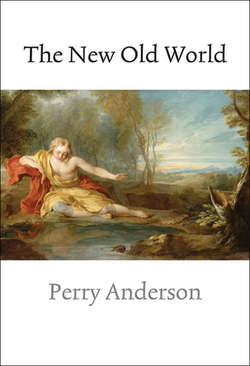Читать книгу The New Old World - Perry Anderson - Страница 19
На сайте Литреса книга снята с продажи.
2007
ОглавлениеAn epiphany is beguiling Europe. Far from dwindling in historical significance, the Old World is about to assume an importance for humanity it never, in all its days of dubious past glory, possessed. At the end of Postwar, his eight-hundred-page account of the continent since 1945, the historian Tony Judt exclaims at ‘Europe’s emergence in the dawn of the twenty-first century as a paragon of the international virtues: a community of values held up by Europeans and non-Europeans alike as an exemplar for all to emulate’. The reputation, he eagerly assures us, is ‘well-earned’.1 The same vision grips the seers of New Labour. Why Europe Will Run the 21st Century declaims the title of a manifesto by Mark Leonard, the party’s foreign policy Wunderkind. ‘Imagine a world of peace, prosperity and democracy’, he enjoins the reader. ‘What I am asking you to imagine is the “New European Century” ’. How will this entrancing prospect come about? ‘Europe represents a synthesis of the energy and freedom that come from liberalism with the stability and welfare that come from social democracy. As the world becomes richer and moves beyond satisfying basic needs such as hunger and health, the European way of life will become irresistible’.2 Really? Absolutely. ‘As India, Brazil, South Africa, and even China develop economically and express themselves politically, the European model will represent an irresistibly attractive way of enhancing their prosperity whilst protecting their security. They will join with the EU in building “a New European Century” ’.3
Not to be outdone, the futurologist Jeremy Rifkin—American by birth, but by any standards an honorary European: indeed a personal adviser to Romano Prodi when he was president of the European Commission—has offered his guide to The European Dream. Seeking ‘harmony, not hegemony’, he tells us, the EU ‘has all the right markings to claim the moral high ground on the journey toward a third stage of human consciousness. Europeans have laid out a visionary roadmap to a new promised land, one dedicated to re-affirming the life-instinct and the Earth’s indivisibility’.4 After a lyrical survey of this route—typical staging-posts: ‘Governing without a Centre’, ‘Romancing the Civil Society’, ‘A Second Enlightenment’—Rifkin, warning us against cynicism, concludes: ‘These are tumultuous times. Much of the world is going dark, leaving many human beings without clear direction. The European Dream is a beacon of light in a troubled world. It beckons us to a new age of inclusivity, diversity, quality of life, deep play, sustainability, universal human rights, the rights of nature, and peace on Earth’.5
These transports may seem peculiarly Anglo-Saxon, but there is no shortage of more prosaic equivalents on the continent. For Germany’s leading philosopher, Jürgen Habermas, Europe has found ‘exemplary solutions’ for two great issues of the age, ‘governance beyond the nation-state’ and systems of welfare that ‘serve as a model’ to the world. So why not triumph in a third? ‘If Europe has solved two problems of this magnitude, why shouldn’t it issue a further challenge: to defend and promote a cosmopolitan order on the basis of international law?’6—or, as his compatriot the sociologist Ulrich Beck puts it, ‘Europeanisation means creating a new politics. It means entering as a player into the meta-power game, into the struggle to form the rules of a new global order. The catchphrase for the future might be: Move over America—Europe is back’.7 Over in France, Marcel Gauchet, theorist of democracy and an editor of the country’s central journal of ideas, Le Débat, explains that ‘we may be allowed to think that the formula the Europeans have pioneered is destined eventually to serve as a model for the nations of the world. That lies in its genetic programme’.8
